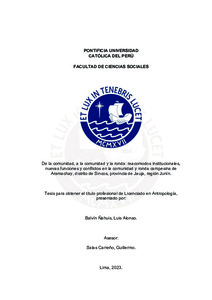| dc.contributor.advisor | Salas Carreño, Guillermo | |
| dc.contributor.author | Balvín Ñahuis, Luis Alonso | |
| dc.date.accessioned | 2024-01-10T16:25:50Z | |
| dc.date.available | 2024-01-10T16:25:50Z | |
| dc.date.created | 2023 | |
| dc.date.issued | 2024-01-10 | |
| dc.identifier.uri | http://hdl.handle.net/20.500.12404/26748 | |
| dc.description.abstract | La presente tesis como objetivo general analiza de qué manera la creación de la
ronda campesina viene significando una nueva distribución de funciones y formas de
cooperación y/o de conflictos con las instituciones preexistentes en la comunidad
campesina de Aramachay, distrito de Sincos, provincia de Jauja, región Junín. Este
espacio comunal, ubicado en el valle del Mantaro, tiene una ronda campesina de
reciente creación. La metodología es cualitativa y etnográfica, por lo que se aleja de
toda idea de “generalización” siendo más un aporte investigativo de carácter
exploratorio y “desde adentro”. Mi principal conclusión es que el surgimiento de la
ronda campesina en Aramachay, ha significado un proceso de reacomodo de roles y
funciones al interior de la comunidad campesina. Esta nueva institución asumió las
tareas de administración de justicia y control social; que antes de su creación eran
roles asumidos por otras instituciones comunales. La ronda también asumió nuevas
funciones, que atendieron problemáticas que no habían podido ser resueltas
previamente por la comunidad, como conflictos de tierra con poblaciones vecinas,
temas vinculados a la educación, articulaciones supra comunales y en red. En ese
sentido, esta tesis invita a reflexionar no solamente sobre los cambios ocurridos al
interior de la estructura comunal ante el surgimiento de la ronda, sino también sobre
un abanico de nuevas funciones, roles y las posibilidades del desarrollo de las
organizaciones políticas rondero-comunales en el Perú actual. | es_ES |
| dc.description.abstract | This thesis has a general objective. Analyzing how the creation of the peasant guard
has meant a new distribution of functions and forms of cooperation and/or conflicts
with pre-existing institutions in the peasant community. To develop this objective, I
address the case of the peasant community of Aramachay, district of Sincos, province
of Jauja, Junín region; Historical communal space located in the Mantaro valley and
which has a recently created peasant guard. The methodology used has been
qualitative and ethnographic, so it moves away from any idea of "generalization" being
more of an investigative contribution of an exploratory nature and "from within". My
main conclusion is that the emergence of the peasant guard in Aramachay has meant
a process of rearrangement of roles and functions within the peasant community from
which it comes. This new institution assumed the tasks of administration of justice and
social control; that before its creation were roles assumed by other communal
institutions. As well as new functions, which dealt with problems that had not been
previously resolved by the community, such as land conflicts with neighboring
populations, issues related to education, supra-communal and network articulations.
In this sense, this thesis invites us to reflect not only on the changes that have occurred
within the communal structure before the emergence of the guard, but also on a new
range of new functions, roles and development of the communal rondero political
organization in Peru in the coming years. | es_ES |
| dc.language.iso | spa | es_ES |
| dc.publisher | Pontificia Universidad Católica del Perú | es_ES |
| dc.rights | info:eu-repo/semantics/openAccess | es_ES |
| dc.rights.uri | http://creativecommons.org/licenses/by-nc-nd/2.5/pe/ | * |
| dc.subject | Rondas campesinas--Perú--Sincos (Junín : Distrito) | es_ES |
| dc.subject | Organización de la comunidad--Perú--Sincos (Junín : Distrito) | es_ES |
| dc.subject | Violencia política--Perú--Sincos (Junín : Distrito) | es_ES |
| dc.title | De la comunidad, a la comunidad y la ronda: reacomodos institucionales, nuevas funciones y conflictos en la comunidad y ronda campesina de Aramachay, distrito de Sincos, provincia de Jauja, región Junín | es_ES |
| dc.type | info:eu-repo/semantics/bachelorThesis | es_ES |
| thesis.degree.name | Licenciado en Antropología | es_ES |
| thesis.degree.level | Título Profesional | es_ES |
| thesis.degree.grantor | Pontificia Universidad Catolica del Peru. Facultad de Ciencias Sociales | es_ES |
| thesis.degree.discipline | Antropología | es_ES |
| renati.advisor.dni | 09677695 | |
| renati.advisor.orcid | https://orcid.org/0000-0003-4770-4550 | es_ES |
| renati.author.dni | 46638404 | |
| renati.discipline | 222016 | es_ES |
| renati.juror | Diez Hurtado, Antonio Alejandro | es_ES |
| renati.juror | Mendoza Lozano, Rafael Anibal | es_ES |
| renati.juror | Salas Carreño, Guillermo | es_ES |
| renati.level | https://purl.org/pe-repo/renati/level#tituloProfesional | es_ES |
| renati.type | https://purl.org/pe-repo/renati/type#tesis | es_ES |
| dc.publisher.country | PE | es_ES |
| dc.subject.ocde | https://purl.org/pe-repo/ocde/ford#5.04.03 | es_ES |







